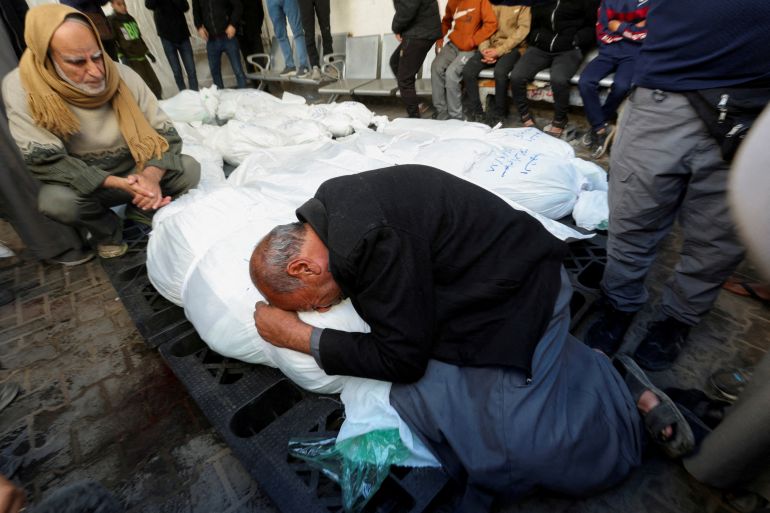Israel drops leaflets seeking intel on captives, as Gaza attacks continue
Israel’s military drops flyers showing faces of captives in southern Gaza, as protesters in Israel call for Netanyahu to make a deal to free them.

Israeli forces have dropped leaflets in the southern Gaza Strip, asking residents to provide information about the captives taken by Hamas on October 7, as bombardment of the besieged enclave continues.
The leaflets dropped on Saturday, showed the photos of dozens of captives still in Gaza, together with a message suggesting there would be benefits for anyone providing information to Israel.
Keep reading
list of 4 itemsNon-Aligned Movement criticises Israel’s war on Gaza at Kampala summit
Gaza’s morning ritual: Searching under rubble for dolls, books, loved ones
People are getting sick because of Israel’s war on Gaza
“You want to return home? Please report if you identified one of them,” read the message, which also listed a phone number and a link to a website containing images and names of the captives in Arabic.
“They are asking people’s help because they are unable to get to their hostages because of the resistance,” said Abu Ali, one north Gaza resident. “End the war, Netanyahu, and get your people back,” he told the Reuters news agency.
Israeli army has dropped leaflets that state they have conditioned the forced displacement of Palestinian citizens (war crime) on the return of the hostages. So, although their abduction had nothing to do with them Palestinian citizens are being collectively punished (war crime). https://t.co/PC9eqWToFV
— Naks Bilal (@NaksBilal) January 20, 2024
The captives were taken during Hamas’s October 7 attack on southern Israel in which more than 1,100 people were killed. Israel has since relentlessly bombarded Gaza, killing more than 24,900 Palestinians, mostly women and children.
More than 100 of the captives were freed during a short-lived November truce between Israel and Hamas. Israel says 132 remain in Gaza and 27 have died in captivity.
‘Captives matter’
On Saturday in the Israeli capital, dozens of relatives of the captives rallied outside the private residence of Prime Minister Benjamin Netanyahu, demanding he reach a deal with Hamas to ensure their release.
The protesters plan to spend the night in tents outside Netanyahu’s house in the coastal town of Caesarea – some 60km (37 miles) north of Tel Aviv – to protest against his lack of progress.
“The protesters said that they wanted Netanyahu to step out and speak to them,” said Al Jazeera’s Laura Khan, reporting from occupied East Jerusalem.
“One person, whose brother is in captivity and whose mother was released in the last deal, said Netanyahu looked her in the eyes and said the captives matter. She believes he’s lying. She said there was blood on his hands,” she added.
People standing outside Netanyahu’s home held up posters reading, “We want a deal now”, Khan noted.
On Friday, Israeli war cabinet minister and former military chief Gadi Eizenkot said a deal will be needed to ensure captives still held in the Gaza Strip are released alive, adding that a lightning raid would be extremely unlikely to succeed.
However, Netanyahu has said he will push for “complete victory” against Hamas but has not outlined how he would achieve it.
Meanwhile, in Israel’s third-largest city, Haifa, an anti-war protest took place on Saturday with Israeli Jews and Palestinian citizens of Israel coming together to call for an end to the fighting in Gaza.
“The message here is to end the war and that [the Israelis] can only live peacefully, side by side, with a political solution for the Palestinians,” said Al Jazeera’s Stefanie Dekker, reporting from the protest, which Israeli officials only allowed to take place for two hours.
No end in sight
In Gaza, attacks showed no signs of stopping as the health ministry said Israeli attacks killed 165 people and wounded 280 others in the past 24 hours.
“There hasn’t been any let-up in the intense bombing across the Gaza Strip and it looks like it’s all started again in the north where more residential buildings have been targeted,” said Al Jazeera’s Hani Mahmoud, reporting from Rafah.
“There appears to be a surge in the intensity and scale of the bombings, with the remaining buildings in the vicinity of al-Shifa Hospital and the western part of Gaza City and Jabalia and Beit Lahiya being hit.”
The vicinity of Nasser hospital in the southern city of Khan Younis also came under heavy bombardment, Mahmoud noted. The facility is one of the few partially functioning hospitals in Gaza.
In more than 100 days of war, Israel’s air, land and sea offensive has devastated much of Gaza, displacing most of the 2.3 million population, many forced to move repeatedly and seek refuge in tents that do little to protect them from the elements and disease, according to the United Nations.